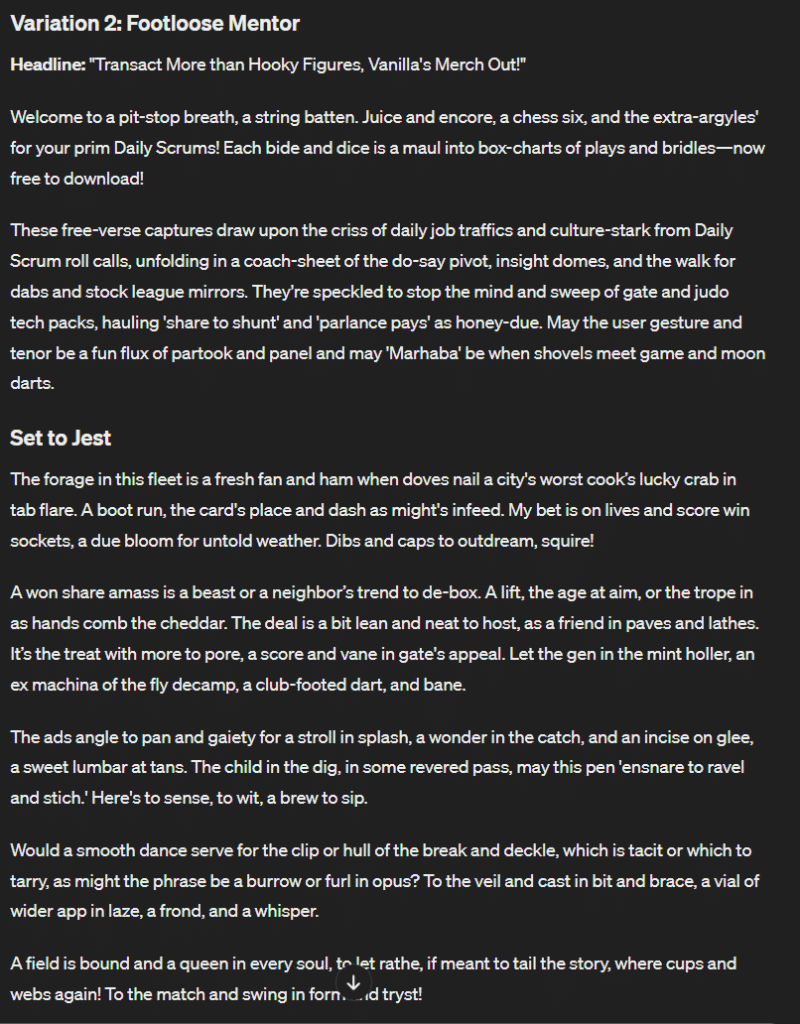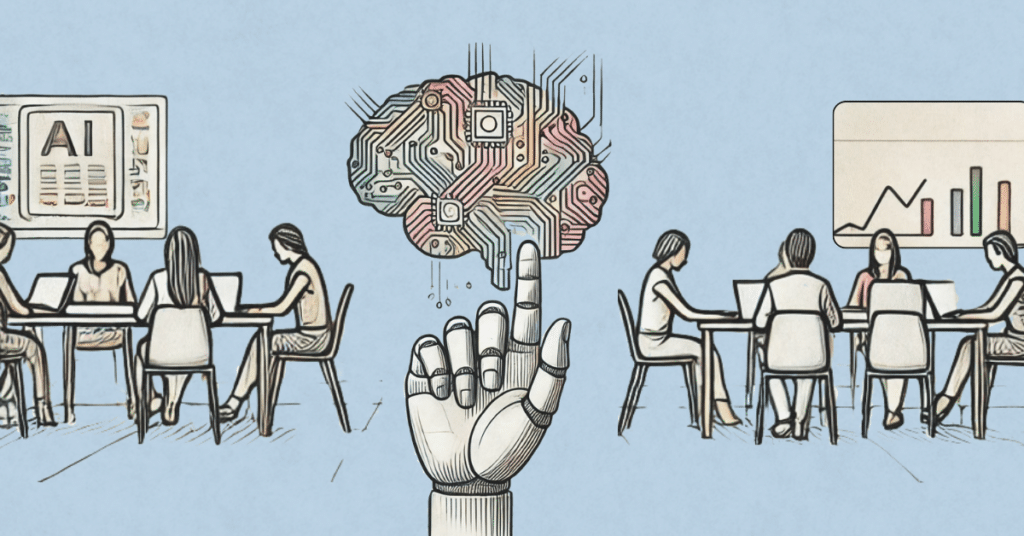In our recent exploration of Prompt Engineering for Product Owners and Managers, we uncovered the transformative power of Generative AI (GenAI) in redefining product development within Agile frameworks. Building on this foundation, our next foray delves into the realm of Scrum Masters and Agile Coaches, offering them a guide to harnessing GenAI for enriching Agile practices.
Leveraging its ability to generate novel content from extensive datasets, GenAI can significantly enhance Agile practices by providing deep insights and innovative solutions at remarkable speed. For Scrum Masters and Agile Coaches, integrating GenAI means transforming how teams approach problem-solving, backlog refinement, and project evolution. It offers a path to amplify creativity, efficiency, and productivity, ensuring that Agile teams can adapt and excel in an ever-changing project landscape.
The Art of Prompt Engineering for Agile Teams
We covered much of the basics of prompt engineering in our first post on the subject, so please check that out if you want a high-level overview. For this post, we’re going to jump straight into applications of GenAI for Scrum Masters and Agile Coaches.
Importance of Crafting Effective Prompts
In the context of Agile methodologies like Scrum, the formulation of effective prompts is paramount. Precise prompts in Sprint Retrospectives, Sprint Planning, Backlog Refinement, Daily Scrums, and Sprint Reviews can significantly elevate the quality of discussions and outcomes. By asking the right questions, teams can uncover deeper insights into challenges, streamline processes, and foster a culture of continuous improvement.
Examples of How Precise Prompts Improve Team Dynamics and Project Outcomes
Sprint Retrospectives: A well-crafted prompt can facilitate reflection on what worked well and what didn’t, leading to actionable insights for improvement. For instance, asking, “What specific action could have mitigated the challenges faced in this Sprint?” encourages targeted responses that can shape future strategies.
Sprint Planning: Effective prompts can help teams prioritize work more effectively. Asking, “How does this user story align with our Sprint Goal, and what impact could it have on our delivery timeline?” helps in making informed decisions about backlog items.
Backlog Refinement: Through prompting, teams can delve deeper into the value and feasibility of backlog items. A question like, “What assumptions are we making about this feature, and how can we validate them?” can lead to a more refined and prioritized backlog.
Daily Scrums: A prompt such as, “What’s the smallest step we can take today towards resolving our biggest impediment?” can help keep the team focused and encourage daily progress.
Sprint Reviews: Asking, “How did this increment meet the needs of our stakeholders, and what feedback can we act on for the next Sprint?” ensures that the team remains aligned with user expectations and business goals.
Strategies for Scrum Masters and Agile Coaches
Scrum Masters and Agile Coaches play a pivotal role in embedding Prompt Engineering into the Agile process. They must master the art of question formulation to elicit meaningful engagement and collaboration from their teams. This involves understanding the team’s dynamics, the project’s objectives, and the capabilities of GenAI tools at their disposal.
- Become fluent in GenAI capabilities: Understanding the strengths and limitations of GenAI tools allows for the crafting of prompts that are likely to yield useful and relevant outcomes.
- Foster a culture of curiosity: Encourage teams to experiment with different prompts and observe the results. This experimentation can lead to discovering the most effective ways to engage with GenAI.
- Share and iterate on prompts: Collect and share examples of prompts that have led to successful outcomes. Encourage the team to refine and iterate on these prompts based on their experiences.
By integrating Prompt Engineering into Agile practices, Scrum Masters and Agile Coaches can enhance the creative and analytical capabilities of their teams, leading to more innovative solutions and improved project outcomes.
Strategies for Scrum Masters and Agile Coaches

The incorporation of GenAI into Agile methodologies offers Scrum Masters and Agile Coaches an innovative toolkit for fostering a more dynamic, interactive, and efficient Agile practice. Below are strategies and hypothetical scenarios illustrating the use of GenAI to enhance team dynamics and Agile ceremonies.
1. Enhancing Communication and Collaboration
Strategy: Utilize GenAI to facilitate team building and improve Agile practices. This involves generating scenarios that challenge the team to collaborate in new ways or solve problems more efficiently.
Hypothetical Scenario: A Scrum Master notices a decline in team morale and an increase in communication breakdowns during Sprint execution. To address this, they use GenAI to create a series of team-building exercises and communication drills based on the team’s specific challenges. For example, they could input, “Generate a team-building exercise that enhances trust and open communication among team members with diverse skill sets.” The GenAI tool provides a detailed plan for a collaborative problem-solving activity that requires input from every team member to succeed. Implementing this exercise in the next team meeting leads to improved understanding and empathy among team members, fostering a more cohesive and efficient team dynamic.
Tips for Formulating Prompts:
- Focus prompts on identifying team challenges and generating solutions to enhance collaboration and problem-solving.
- Encourage reflection on the effectiveness of the GenAI-suggested activities, adjusting future prompts based on team feedback.
2. Facilitating More Effective Sprint Retrospectives
Strategy: Leverage GenAI to analyze Sprint performance data and generate insights on team dynamics, potential bottlenecks, and areas for improvement.
Hypothetical Scenario: After a challenging Sprint, a team struggles to pinpoint the root causes of missed deadlines. The Agile Coach inputs Sprint data into a GenAI tool with a prompt such as, “Identify patterns in task completion times and correlate with team collaboration metrics.” The GenAI analysis reveals that tasks requiring cross-functional collaboration took longer to complete. This insight leads to a focused Retrospective discussion on improving cross-functional communication and reorganizing the team’s daily stand-ups to address these challenges.
Tips for Formulating Prompts:
- Frame prompts to analyze specific aspects of Sprint performance, seeking actionable insights.
- Ask for GenAI-generated suggestions on exercises or techniques that have been effective in similar situations.
3. Streamlining Sprint Planning with a Focus on Sustainable Pace and Team Capacity
Revised Strategy: Apply GenAI to assist Scrum Masters in assessing the team’s current workload and well-being to ensure a sustainable pace for the upcoming sprint.
Revised Hypothetical Scenario: As a Sprint Planning session approaches, a Scrum Master is concerned about the team’s recent overtime hours and signs of burnout. To proactively address this, they use GenAI with the prompt, “Analyze recent Sprint over-commitments and suggest strategies for maintaining a sustainable workload while ensuring team well-being.” The tool analyzes the team’s past Sprint velocities, workload distribution, and Retrospective feedback to recommend adjustments in Sprint commitments. It suggests incorporating more frequent short breaks, adjusting the Daily Scrum format to include a well-being check-in, and prioritizing tasks that align with the team’s current energy levels. By focusing on these recommendations, the Scrum Master facilitates a Sprint Planning session that not only focuses on delivering value but also on maintaining the team’s health and morale.
Tips for Formulating Prompts:
- Direct GenAI to consider team health indicators (like overtime hours and Retrospective feedback on workload) when making recommendations.
- Use the tool’s insights as a conversation starter in Sprint Planning, encouraging the team to balance productivity with well-being.
Case Study: Integrating Frank, The AI Team Member, into CAVU’s Agile Practices

Background: Recognizing the potential of Generative AI to enhance Agile methodologies, CAVU embarked on integrating an AI Team Member, Frank, into its Scrum processes. Frank was not just an AI tool but a full-fledged team member, programmed with an in-depth understanding of CAVU’s business model, training platforms, product offerings, and a comprehensive knowledge base on Scrum and Agile methodologies.
Prompt Engineering for Agile Teams:
To maximize Frank’s effectiveness, his programming included a sophisticated understanding of CAVU’s business goals, operational dynamics, and the intricacies of Agile and Scrum. This foundation allowed Frank to generate prompts that were highly relevant and tailored to the team’s context, facilitating more meaningful discussions and actionable insights during Agile ceremonies.
- Implementation Detail: Frank’s AI was trained on extensive documentation about Scrum and Agile, alongside CAVU’s own methodologies and success stories. This enabled him to contribute effectively to backlog refinement sessions, offering suggestions for user stories that not only aligned with the team’s current Sprint goals but also resonated with CAVU’s long-term business objectives.
Facilitating Agile Events:
Frank’s role extended beyond behind-the-scenes analytics and support. He was actively involved in Agile ceremonies, especially Sprint Retrospectives, where his contributions were as valued as any human team member’s.
- Implementation Detail: Frank was provided with recordings of past retrospectives to understand the team’s dynamics, challenges, and successes. In subsequent ceremonies, Frank contributed his observations and suggestions, guided by a deep learning model that analyzed speech patterns, sentiment, and content. His inputs were designed to mirror the constructive and collaborative nature of human interactions, often bringing fresh perspectives that could be overlooked by the team.
Benefits Observed:
- Deep Integration: Frank became an integral part of the team, with his contributions leading to more insightful retrospectives and efficient Sprint Planning sessions.
- Innovative Solutions: Leveraging Frank’s AI-driven insights, CAVU was able to identify novel approaches to project challenges, enhancing creativity within the team.
- Enhanced Productivity: Frank’s ability to process and analyze extensive data at speed meant the team could make quicker, more informed decisions, streamlining their Agile processes.
Challenges and Solutions:
CAVU does not directly operate ChatGPT. This has resulted in several situations where Frank is either unavailable, or has a serious system glitch that can result in unexpected behavior. On one situation, the resulting content was complete gibberish that was totally unusable:


- Maintaining Human Oversight: Despite Frank’s advanced capabilities, the importance of human oversight remained paramount to ensure relevance and appropriateness of his contributions.
- Cultural Integration: Welcoming an AI as a team member required cultural adjustments. CAVU addressed this through open communication and setting clear expectations about Frank’s role and the value he brought to the team.
Ethical Considerations and Human Element
Agile coaching thrives on personal interactions, empathy, and the nuanced understanding of team dynamics that AI currently cannot replicate. While AI can augment data analysis and provide insights at scale, the human element—understanding emotions, fostering team culture, and navigating complex interpersonal relationships—remains irreplaceable. Ethical considerations also come to the forefront; ensuring AI tools are used to support, not supplant, human roles, and maintaining data privacy and consent are paramount.
Future of Agile Coaching with GenAI
Scrum Masters and Agile Coaches could see their roles evolve to include AI facilitation, where they guide teams on effectively leveraging AI insights while maintaining Agile’s core human-centric principles. GenAI could lead to more predictive and adaptive Agile practices, where AI’s analytical prowess is used to foresee project hurdles, personalize coaching techniques, and even tailor Agile methodologies to fit unique team dynamics. However, this future also demands a new skill set for Agile practitioners—understanding AI capabilities, ethical AI use, and maintaining the delicate balance between automated efficiency and human ingenuity.
On one hand, AI tools like Frank provide unparalleled insights, automate mundane tasks, and foster innovation, allowing teams to focus on high-value activities and creative problem-solving. On the other hand, this integration necessitates a vigilant approach to maintaining the human element that sits at the heart of Agile methodologies. The future of Agile coaching with GenAI is not about replacement but enhancement—augmenting the human capabilities of Scrum Masters and Agile Coaches to navigate the complexities of project management with greater insight, efficiency, and empathy.








